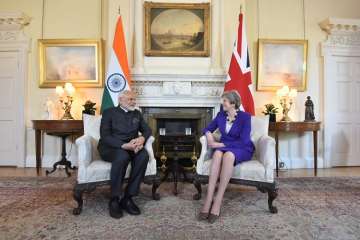Asserting that terrorism cannot be associated with any religion, India and the UK on Wednesday vowed to strengthen cooperation in taking decisive action against globally-proscribed terror groups such as Pakistan-based Jaish-e-Mohammad and Lashkar-e-Taiba.
The strong pledge to combat terror was made after Prime Minister Narendra Modi and his British counterpart Theresa May held "fruitful discussions" here on multiple aspects of the India-UK relations.
A 10 Downing Street statement said that the Syria air strikes, counter-terrorism, radicalisation and online extremism were among the key topics covered by both the leaders during their talks.
Also read: PM Modi pays floral tributes at Lingayat philosopher Basaveshwara bust in London
The two leaders reiterated their strong condemnation of terrorism in all its forms, including terrorism and terror-related incidents in both India and the UK, a joint statement issued after the talks said.
Modi and May affirmed that terrorism cannot be justified on any grounds and it should not be associated with any religion, creed, nationality and ethnicity, it said.
The leaders agreed that terrorist and extremist organisations need to be denied space to radicalise, recruit and conduct attacks on innocent people and to achieve this end all countries need to work together to disrupt terrorist networks, their financing and movement of terrorists, including foreign terrorist fighters, the statement said.
Modi and May agreed to strengthen cooperation to take "decisive and concerted actions against globally-proscribed terrorists and terror entities to protect our citizens, including Lashkar-e-Taiba, Jaish-e-Mohammad, Hizb-ul-Mujahideen, Haqqani Network, al-Qaeda, ISIS (Da'esh) and their affiliates, as well as tackling the online radicalisation and violent extremism which feeds this", it said.
The attack on ex-Russian double agent Sergei Skripal and his daughter Yulia using a nerve agent last month in Salisbury also found a mention in the joint statement.
"In the wake of the appalling nerve agent attack in Salisbury, the UK and India have reiterated their shared interest in strengthening the disarmament and non-proliferation regimes against the spread and use of chemical weapons," the statement said.
British officials say the Russian government was behind the attack using a Soviet-developed type of nerve agent known as Novichok. Russia denies involvement in the attack and has accused Britain of failing to share its evidence.
Modi and May also shared their deepest concern over the continued reports of the use of chemical weapons in Syria, the statement said.
"They oppose the use of chemical weapons anywhere, at any time, by anybody, under any circumstances and are committed to strengthening the effective implementation of the Chemical Weapons Convention," it said.
The two leaders emphasised the need for urgent investigations and underline that the conduct of all investigations of any use of chemical weapons must be strictly in accordance with the provisions of the convention.
Latest World News
